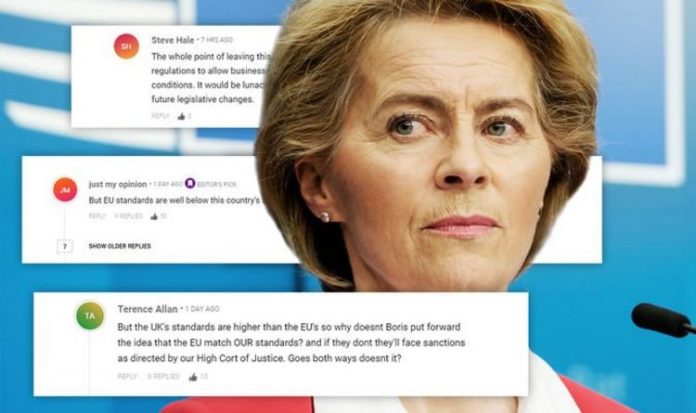Speaking at an event this week, the official claimed she would not sanction any pact without regulatory alignment between the UK and EU. With talks so far failing to produce an agreement, Ms von der Leyen insisted the UK would not be allowed access to the single market unless an agreement on the level playing was reached. She also warned the UK would need to sign “non-regression” pacts on certain areas such as environmental standards in order to achieve quota-free access and.
However, upon hearing her remarks, Britons were left incensed by the demands despite the UK having left the bloc.
In response, one person wrote: “The EU standards are well below this country’s own standards.”
A second wrote: “The whole point of leaving this ‘club’ is to escape their heavy-handed rules and regulations to allow businesses to be leaner and able to adapt to market conditions.
“It would be lunacy to accept their rules and then have no control on future legislative changes.”
A third questioned: “But the UK’s standards are higher than the EU’s so why doesn’t Boris put forward the idea that the EU match OUR standards?
“And if they don’t they’ll face sanctions as directed by our High Court of Justice.
“Goes both ways doesn’t it?”
The issue of a level playing field has remained one of the main areas of divergence between the UK and EU.
JUST IN: Brexit LIVE: EU member states order Barnier to ‘slow talks down’
The issue of state aid also arose following the creation of the UK Internal Market Bill.
Within the withdrawal agreement, the UK and EU established the Northern Ireland principle.
Under this, Northern Ireland would remain in the EU’s state aid infrastructure and is considered a de facto member of the single market.
The Internal Market Bill, however, deems the Secretary of State can control the notification of state aid levels to the EU while the Government can edit customs-exit declarations.
Principally, the UK argued the bill was to maintain trade between the four devolved nations and has stated Britain and Northern Ireland cannot be tied to EU rules due to Brexit.
Talks resumed this week but have so far failed to break the deadlock between the two sides.
Now under a month away, the EU is now running out of time to agree a deal for it to then be ratified by the European Parliament.
Due to the nature of the agreement, the deal will also need to be ratified by national governments.
This, however, could be delayed until a later date similar to the EU-Canada trade agreement which is yet to have completed the ratification process.







